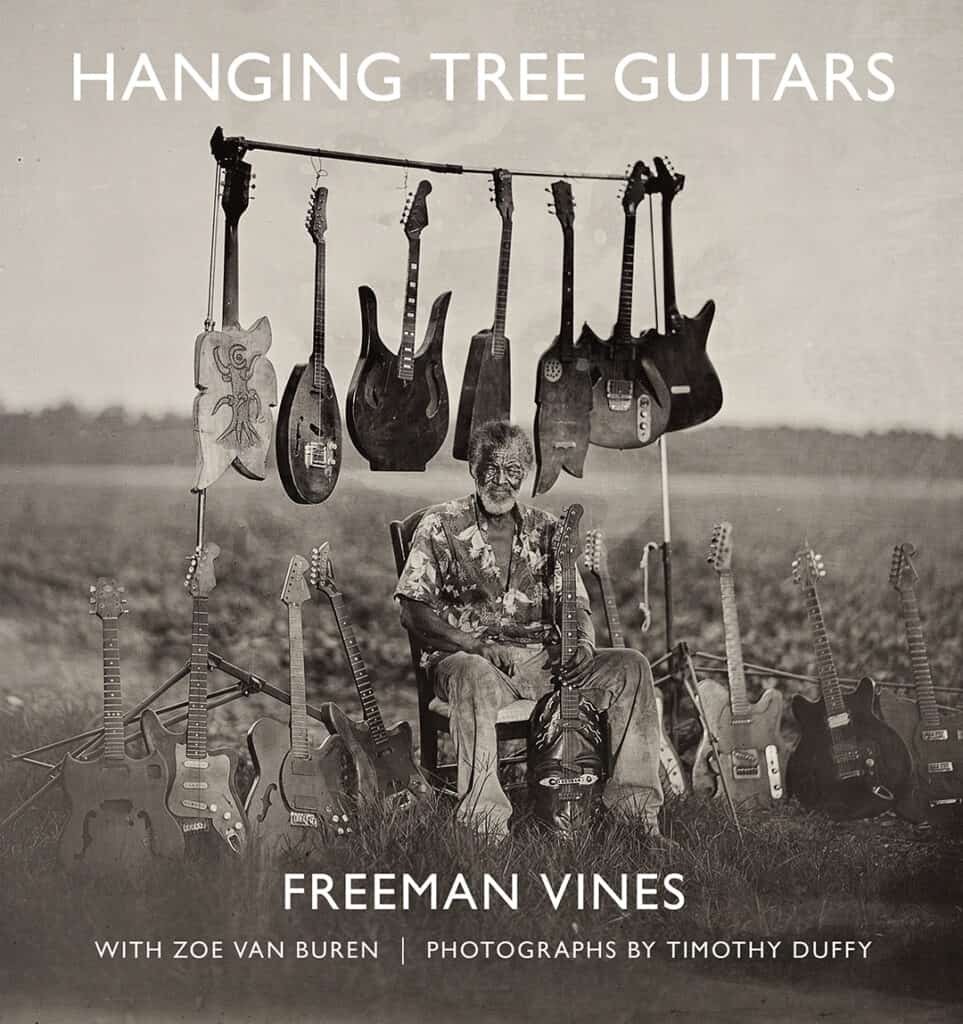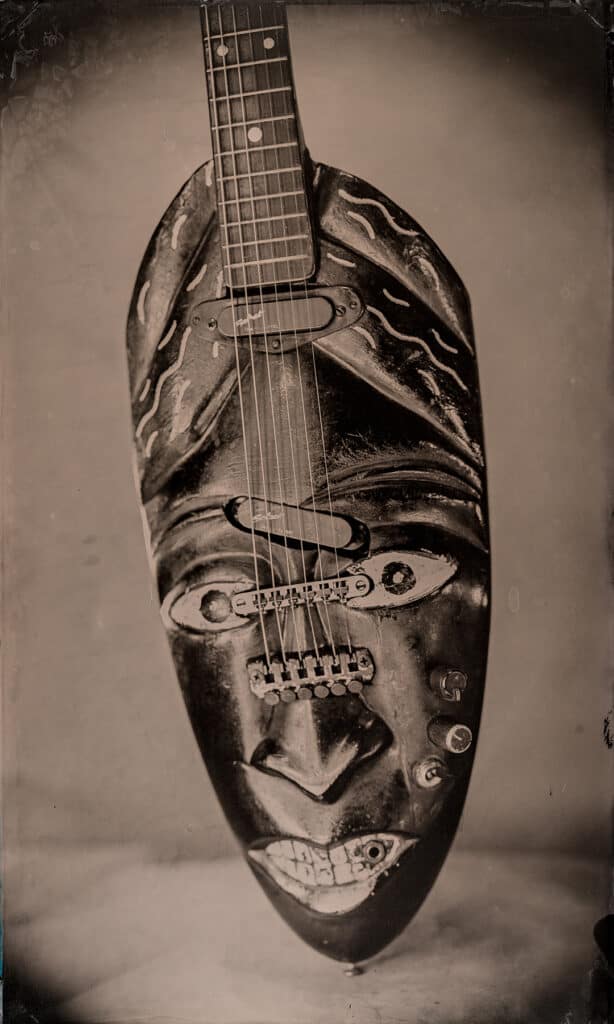Freeman Vines Carves History into his Instruments
If ever there was an example of the transformative power of art, it would be the work of Freeman Vines in the Hanging Tree Guitars. From the land of “strange fruit” comes exquisitely hand carved guitars which strum the stories of a dark history. Vines’ compelling works will be on display at “A Celebration of Trees,” an ecological multi-media exhibition at the Southampton Arts Center curated by Laurie Dolphin with Daniela Kronemeyer and Coco Myers through December 18th.

Photos: Timothy Duffy
Vines, who has worked for the past fifty years on his creations explains, “The wood ain’t dead. You communicate with it. Some wood has a bad attitude. Some tell lies. The wood has its own character. If you follow it, it tells you what to do and it comes out good, but you can’t do the same thing twice.”
Now in his 70’s Vines grew up in Jim Crow North Carolina in Greene County, “One of the worst places in that day and time.” Knowing only three chords, he searched for wood to carve into his own guitars. He recounts the story, “I went to Mr. Jefferson because a guy told me Mr. Jefferson had wood. And he said, ’Vines, I’m gonna tell you now. You’re black and I’m white. That wood there came off a hanging tree.’ I said, ‘I don’t even believe that.’ He said, ‘I don’t give a damn what you believe. They used to hang people on that tree.’ He said that wood was over a hundred years old.”
The carvings from this black walnut became more of a portrait than instrument and indeed Vines says, “It made a sinister sound.” Instead of smooth surfaces, raised skulls and death masks emerged with sunken eyes and grimaced faces. “I reckon, in my imagination, it’s the man that died on that tree” he says. When photographer Timothy Duffy came calling at Vines home overlooking a tobacco field with his special camera to document the fascinating man and his work, they joined together to find the identity of the man who was lynched. Their journey turned into a stunning book “Hanging Tree Guitars” by Freeman Vines with additional text by Zoe Van Buren and photography by Timothy Duffy.

When asked if he thinks there are spirits in the wood Vines says, “You know there are. They’ve got to be. They’ve got nowhere else to go. The wood, actually everything, is involved spiritually. A little spirit rubs off on everything.” Vines himself who only learned to read and write when he was in prison at age 14 for selling moonshine, studied Edgar Cayce, Madame Blavatsky and Wicca. He reflects a deep and soulful connection to the unseen realm and its lasting vibrational power, shunning professional but vapid guitar wood for that from a tobacco barn or mules’ trough whose history yearns for shape shifting and a voice. After losing some of these precious guitars to theft, loss and evictions, Vines was reinspired when Duffy gave him the wood of an old Steinway Piano that had been languishing in his studio. “That wood has the best sound,” says Vines, “It sounds so soothing and good. The grain had been beat by the piano so much it loved the vibration.”
Music was essential to Vines’ family and while they were raised on Hillbilly his sister also introduced him to Jose Feliciano. His sisters still perform as a touring gospel group. They and Freeman have all been aided by the Music Maker Foundation which not only documents and preserves America’s traditional musicians but forms long-term relationships with them to raise their standard of living and level of expertise. Vines, who has experienced what he calls out of body experiences says, “The key is to keep your eye on the thread that ties the soul to the body.” And indeed, he connects the thread of the tree to the instrument he makes and the song it was destined to play.












!['The Maples' is a prestigious generational compound of two extraordinary estates: 18 Maple and 22 Maple. This rare offering, designed by luxury architect Lissoni partners New York and developed by visionaries Alessandro Zampedri-CFF Real Estate and JK Living, redefines opulence with the highest quality of craftsmanship and captivating views of the Atlantic Ocean. Represented by @nycsilversurfer and @challahbackgirl of @douglaselliman. [link in bio]](https://hamptonsrealestateshowcase.com/wp-content/uploads/sb-instagram-feed-images/438891010_1083749139481747_7890082604579275354_nfull.jpg)
![Featuring 360-degree water views on Mecox Bay, the Atlantic Ocean and Channel Pond, 1025 Flying Point offers the ultimate beach cottage that is flooded with natural light. With panoramic views, proximity to the ocean, and a private walkway to Mecox bay for kayaking or paddle boarding, this truly is a special retreat. Represented by @ritcheyhowe.realestate and @hollyhodderhamptons of @sothebysrealty. [link in bio]](https://hamptonsrealestateshowcase.com/wp-content/uploads/sb-instagram-feed-images/438994305_737511778456166_4602476013493875279_nfull.jpg)
![Attention advertisers! 📣 Secure your spot in the highly anticipated Memorial Day edition #HRES. Reach thousands of potential clients and showcase your brand in one of the most sought-after publications in the Hamptons, NYC, Palm Beach, and beyond. Contact us now to reserve your ad space! [link in bio]](https://hamptonsrealestateshowcase.com/wp-content/uploads/sb-instagram-feed-images/438549843_275102939023235_6718257301437562124_nfull.jpg)
![You eat with your eyes, and on the East End, it’s important that what you eat looks just as good as how it tastes. At @rosies.amagansett, the restaurant itself is plenty photo-worthy with blue ceramic tiling and yellow and white striped fabric wallpaper. But for a dish that will light up your photos, head directly to the salmon tartare! [link in bio]](https://hamptonsrealestateshowcase.com/wp-content/uploads/sb-instagram-feed-images/437094269_7296727147115953_1594410326824303644_nfull.jpg)

![We were honored to be the media sponsor for @blackmountaincapital's open house event with @jameskpeyton and @jfrangeskos at 11 Dering Lane in East Hampton! Other sponsors included @landrover, Feline Vodka, @rustikcakestudio, @la_parmigiana, @lahaciendamexicangrill11968, @homesteadwindows, Stone Castle, @talobuilders, and @thecorcorangroup.
A big thank you Carrie Brudner of Black Mountain Capital for putting together this fabulous event! [link in bio]](https://hamptonsrealestateshowcase.com/wp-content/uploads/sb-instagram-feed-images/437081213_762912965932136_6847332836522786568_nfull.jpg)

![Blooms Galore at the Long Island Tulip Festival! 🌷✨ Mark your calendars for April 15th as the vibrant tulips at @waterdrinkerlongisland burst into full bloom! Enjoy a day filled with colorful splendor, food trucks, live music, and more. [link in bio]](https://hamptonsrealestateshowcase.com/wp-content/uploads/sb-instagram-feed-images/437083429_974242677583725_6855805712693638343_nfull.jpg)
